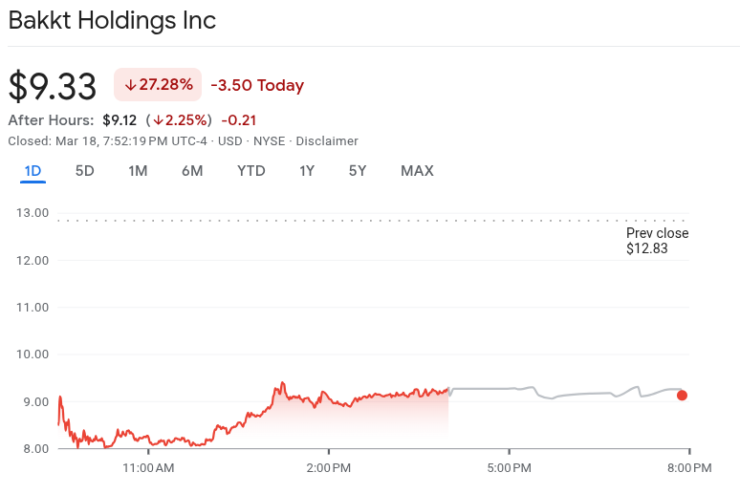Bakkt Holdings (BKKT) saw its stock plunge more than 27% on March 18 after announcing that two of its largest clients, Bank of America and Webull, will not renew their commercial agreements.
The crypto custody and digital asset firm disclosed the terminations in a regulatory filing on March 17, prompting a sharp sell-off that extended into after-hours trading.
According to the filing, Bank of America will allow its commercial agreement with Bakkt to expire on April 22. Webull, a brokerage and crypto trading platform, will follow suit when its agreement ends on June 14.
The loss of these partnerships represents a major hit to Bakkt’s revenue streams. Bank of America contributed 16% of Bakkt’s loyalty services revenue in 2023, while Webull accounted for 74% of its crypto services revenue over the same period.

Following the announcement, Bakkt’s stock closed at $9.33 on March 18, down 27.28% for the day. After hours, shares slipped another 2.25% to $9.12, according to Google Finance. The stock has fallen over 96% from its all-time high of $1,063, reached on October 29, 2021, shortly after Bakkt went public through a $2.1 billion SPAC merger.
Financial Uncertainty and Delayed Filings
In addition to losing its largest clients, Bakkt has postponed its 2024 annual earnings conference call twice. The company’s latest rescheduling has pushed the earnings release to March 19.
Meanwhile, it has requested an extension for filing its annual report with the Securities and Exchange Commission, citing the need for additional time to complete financial statements and finalize its audit.
The delay has raised concerns among investors about the company’s financial health. Under New York Stock Exchange rules, a company must comply with listing requirements, including financial disclosures.
In March, Bakkt received notice from the NYSE that it was no longer in compliance after its stock remained below $1 per share for 30 consecutive days. While the recent stock decline has not yet placed it back under this threshold, the prolonged financial uncertainty remains a risk.
The fallout from Bank of America and Webull’s exits has drawn legal attention. The Law Offices of Howard G. Smith announced it is exploring a potential class action lawsuit against Bakkt, alleging federal securities violations.
The firm claims that Bakkt misled investors about its financial stability and that the abrupt contract terminations directly contributed to the stock’s decline, resulting in financial losses for shareholders.
Bakkt’s parent company, Intercontinental Exchange (ICE), owns a 55% stake. ICE, which also operates the New York Stock Exchange, has not commented on Bakkt’s recent struggles. Meanwhile, neither Bakkt, Bank of America, nor Webull have responded to requests for comment regarding the terminated agreements.
In November 2024, Bakkt briefly saw its share price surge 162% following reports that former President Donald Trump’s media company was in talks to acquire the firm. However, the deal never materialized. In 2024, Bloomberg reported that ICE was considering selling or breaking up Bakkt amid ongoing financial challenges.
With the loss of two key revenue streams, investor confidence in Bakkt remains shaken. The firm’s upcoming earnings release on March 19 is expected to provide further clarity on its financial outlook and the impact of these setbacks on its long-term viability.





